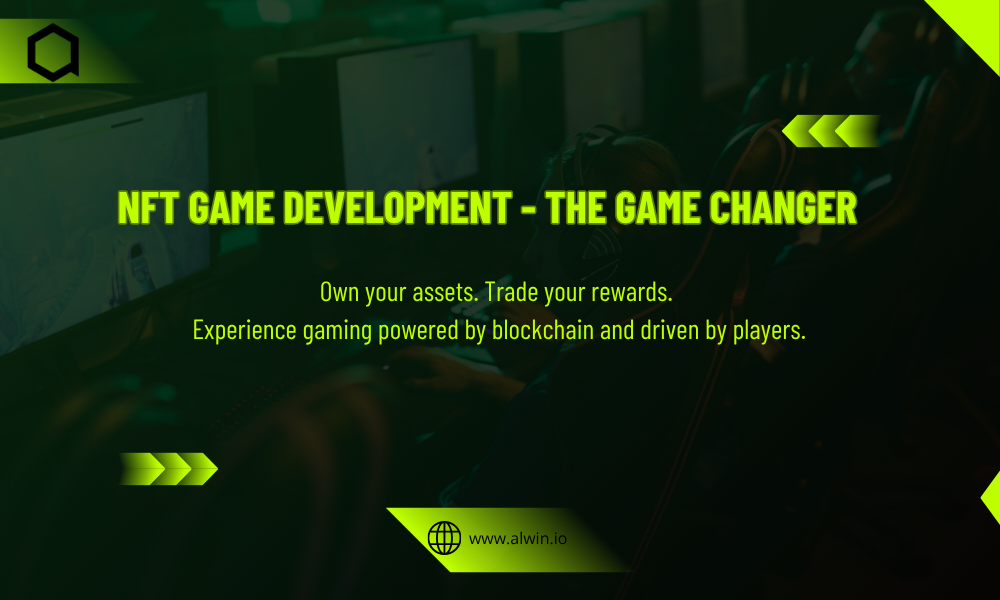NFT stands for Non-Fungible Tokens. An NFT game platform is an online gaming environment where users can play games using non-fungible tokens (NFTs) as an essential part of gameplay. This allows users to buy, sell, and trade their in-game digital assets. This works on play-to-earn (P2E) concepts. Users can get rewards as tokens, and later, they can convert them into real money. Now, NFT games are transforming the gaming world.
What is NFT Game Development?
The process of NFT game development involves creating video games to integrate blockchain technology into non-fungible tokens(NFTs) as in-game assets that allow users to buy, sell, and trade their in-game digital assets. This works in Play-to-Earn (P2E) models to get revenue for both users and developers. This will allow players to get verifiable ownership for their in-game items, like skins, guns, and characters, etc. The development process includes design, blockchain integration, and testing.
Benefits of NFT Game Development
NFT game development benefits include creating a new revenue stream and ownership of in-game digital assets, and engaging players through unique and tradable items. In that game, tokens are transparent and secure transactions on the blockchain.
For Players
Trade assets - Players can trade or sell their digital assets to other players.
Real-world value - These game items are real-world values and can be sold for cryptocurrency, creating a new source of income.
Enhanced security - Blockchain technology helps with secure transactions, and items can’t be duplicated, while each NFT is unique.
For Developers and Businesses
New revenue stream - NFT game generates income through transaction fees on the selling marketplace.
Game expansion - Adding NFT features to expand the existing game, which will increase new users and make it more profitable.
Community expansion - The shared economy of NFTs is making a stronger impact around the game.
Normal Games vs NFT Games
Normal games offer a polished gaming experience for players. They are controlled by a centralized authority, while an NFT game provides blockchain technology for trade and true ownership of in-game digital items.
Normal Games
Gameplay Experience - It has high-quality graphics for an in-game gameplay experience and is more polished for gamers.
Ownership - In-game ownership is a developer's only, not for players, and in-game digital assets haven’t moved outside the game.
Economy - In-game rewards and currency are only in the game's environments, not outside the ecosystem.
Controls - This is a centralized ecosystem controlled by the game studio, and at any time, they can shut down the game.
NFT Games
Gameplay Experience - It has less polished graphics and mainly focuses on blockchain integration for trade, selling players in-game digital assets.
Ownership - In-game digital assets have true ownership for players to trade, sell their in-game items to other players, and can be used outside of the game.
Economy - In-game assets are based on real-world value in the NFT marketplace and can be used with cryptocurrency.
Controls - This is a Decentralized ecosystem with less censorship and controlled by not a single person or authority.
Challenges in NFT Game Development
Challenges in NFT game development include blockchain scalability and high transaction costs, security through smart contract audits, and building a strong and engaged community.
Technical challenges
Cost - Blockchains can have some limitations, such as slow transaction speeds and high fees, which frustrate players. Developers use scalable blockchains and Layer 2 solutions to solve this.
Security - Protecting against vulnerabilities in smart contracts, as a single hack can lead to financial loss for players.
User onboarding - Getting non-crypto players to set up their wallets and understand blockchain concepts can be a barrier to entry.
Community and legal challenges
Property - There are challenges related to copyright, patents, and trademarks, especially sometimes without the original creator's permission.
Market saturation - The market is becoming increasingly competitive, making it difficult for new NFT games to stand out and attract players.
How to Choose the Right NFT Game Development Company?
To choose the right NFT game development company, evaluate their blockchain and NFT expertise, review their portfolio of previous projects, and assess their security measures and post-launch support capabilities.
Expertise - They should know how to work with smart contracts, NFT types like ERC-721 and ERC-1155, and blockchains such as Ethereum, Solana. Check their past projects, look for NFT or play-to-earn games similar to yours. They should also be skilled with game engines like Unity or Unreal and be able to build for mobile, PC, or console.
Security - Your NFT game must be safe and trustworthy. Choose a team that uses strong security tools, runs regular audits, and protects against hacks or fraud. They should also understand the rules and comply to keep their game fair and legal.
Portfolio - Look at the company’s previous work and ask for case studies to see how they plan, design, and launch games. Prefer teams that have already made NFT or blockchain games close to your idea.
Support - They should offer maintenance, updates, and help your game grow with new NFTs or feature updates. A good team builds a game that can easily attract more players to join.
Conclusion
NFT game development is reshaping how players and creators connect with games. By giving players true ownership of in-game assets and creating new earning opportunities. Partnering with the right NFT game development company can help you build games that are not only for fun to play but also part of a new game-driven future.





Comments